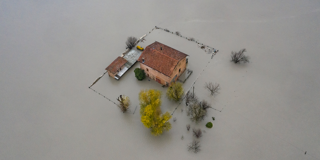For decades, European integration has been a fundamentally political project masquerading as a narrowly economic one. But now that climate change is permanently altering the continent's physical landscape and environmental conditions, this ambiguity will need to give way to a more concrete modernization agenda.
LONDON – For many Europeans, the summer of 2022 was one of the worst in living memory, and not only because of the cruel war on their eastern flank or the return of inflation. Even more important, from a long-term perspective, was the public’s realization that the continent is far more vulnerable than expected to changing environmental conditions. As Europe experiences the warmest winter on record, it must prepare for more climate upheaval, from substantially warmer temperatures to variable water resources, both of which pose a fundamental political challenge to the European project.
For decades, Europeans have concealed the deeply political nature of European integration behind an economic project focused on ensuring the free flow of goods, capital, services, and people between member states. It has worked because the single market can rely on a vast legacy of infrastructure and institutions to ensure its material security. Goods can travel safely across the continent because roads are, for the most part, free from floods. European farmers can produce food thanks to centuries of reclamation and benign rainfall. Financial centers can operate at the rhythm of capital markets because their workers do not have to wade through rivers on their way to work or carry buckets for hours to secure water for their families.
The infrastructure and institutions that convert the climate into such predictable operating conditions are an inheritance, financed, in Europe’s case, by colonial resources and, more recently, by the Marshall Plan, the International Bank for Reconstruction and Development, and member states’ own treasuries. All helped establish the legitimacy of modern European states.

LONDON – For many Europeans, the summer of 2022 was one of the worst in living memory, and not only because of the cruel war on their eastern flank or the return of inflation. Even more important, from a long-term perspective, was the public’s realization that the continent is far more vulnerable than expected to changing environmental conditions. As Europe experiences the warmest winter on record, it must prepare for more climate upheaval, from substantially warmer temperatures to variable water resources, both of which pose a fundamental political challenge to the European project.
For decades, Europeans have concealed the deeply political nature of European integration behind an economic project focused on ensuring the free flow of goods, capital, services, and people between member states. It has worked because the single market can rely on a vast legacy of infrastructure and institutions to ensure its material security. Goods can travel safely across the continent because roads are, for the most part, free from floods. European farmers can produce food thanks to centuries of reclamation and benign rainfall. Financial centers can operate at the rhythm of capital markets because their workers do not have to wade through rivers on their way to work or carry buckets for hours to secure water for their families.
The infrastructure and institutions that convert the climate into such predictable operating conditions are an inheritance, financed, in Europe’s case, by colonial resources and, more recently, by the Marshall Plan, the International Bank for Reconstruction and Development, and member states’ own treasuries. All helped establish the legitimacy of modern European states.